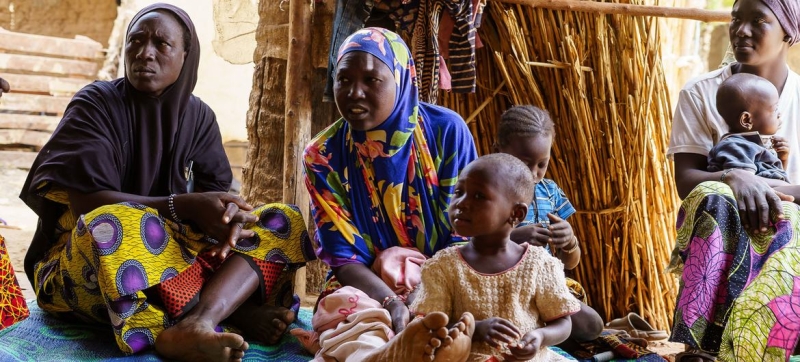- Indian MP Warns Bangladesh Faces Rising Lawlessness |
- Law and Order Must Be Ensured Ahead of Polls: Prof Yunus |
- Tough times ahead, everyone must remain united: Tarique Rahman |
- Sirajganj’s luxuriant mustard fields bloom as an oasis of gold |
- Man killed after boat hits sand-laden bulkhead on Padma River |
UN Warns Sahel Crisis Deepens as Conflict and Climate Drive Mass Displacement

© UNHCR/Insa Wawa Diatta — Women and children sit in a shelter in March 2024 at a site in Soucoura, Mali, hosting refugees from Burkina Faso who fled violence.
Nearly four million people across Africa’s vast semi-arid Sahel region have been uprooted by a volatile mix of conflict, hunger, and climate change, the UN warned on Friday, describing an unfolding crisis of protection and survival that is forcing families to flee repeatedly.
The figure represents a two-thirds increase in displacement over the past five years, with Burkina Faso, Mali, and Niger at the epicentre of overlapping humanitarian emergencies.
“Across the central Sahel, people are being driven from their homes by violence, insecurity, and the devastating effects of climate change,” said Abdouraouf Gnon-Kondé, Regional Director for West and Central Africa at the UN refugee agency (UNHCR).
“Women and children make up 80 per cent of the displaced population, and the protection risks they face – from gender-based violence to trafficking and forced recruitment – are worsening.”
UN reports from the region note that entire communities have been emptied in Burkina Faso, northern Mali, and western Niger as violence between armed groups, intercommunal clashes, and military operations spreads.
Rising insecurity and shrinking access
Most displaced families remain within their countries, but cross-border movements are becoming increasingly common as insecurity spreads and livelihoods collapse.
“These onward movements highlight the urgent need to expand assistance and enable people to remain closer to home,” Mr Gnon-Kondé said, warning that families are under mounting pressure as basic services falter.
Insecurity has forced the closure of more than 14,800 schools across the region, leaving three million children without access to education or safe spaces. Over 900 health facilities have also shut down, cutting off millions from essential care.
Hunger driving displacement
Food insecurity has become a major driver of displacement, with the number of people citing hunger as their primary reason for leaving doubling in recent years.
Humanitarians describe the situation as a chronic hunger emergency. Estimates indicate that more than 32 million people across the wider Sahel need humanitarian assistance and protection — many requiring urgent food and nutrition support.
Farming and livestock rearing have also suffered as families are constantly on the move and extreme weather worsens.
“Climate-related shocks further amplify risks, intensifying competition over scarce natural resources such as land and water,” Mr Gnon-Kondé said. “This is fuelling new displacement and straining social cohesion.”
Funding gap threatens critical services
UNHCR warned that humanitarian access and funding have reached breaking point. Its 2025 appeal for $409.7 million to cover needs in the Sahel is only 32 per cent funded, forcing cuts to registration, shelter, education, and health programmes.
The broader $2.1 billion humanitarian appeal for Mali, Burkina Faso, and Niger — covering all sectors — is similarly underfunded, with only 19 per cent of requirements met so far.
UNHCR called for a renewed international commitment to the region, warning that the crisis will worsen without sustained support.
“Protecting millions of displaced families and securing a safer future demands more than words,” Mr Gnon-Kondé said. “It requires unified, sustained action and true solidarity with the Sahel.”

